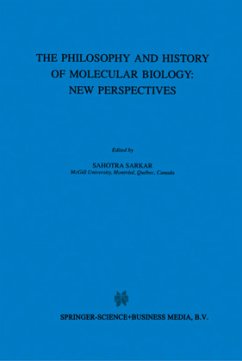
The Founders of Evolutionary Genetics
A Centenary Reappraisal
Herausgegeben: Sarkar, Sahotra
Versandkostenfrei!
Versandfertig in 6-10 Tagen
151,99 €
inkl. MwSt.
Weitere Ausgaben:

PAYBACK Punkte
76 °P sammeln!
genetics. " It is simply the appropriation of that term, very likely with insufficient knowledge and respect for its past usage. For that, the Editor alone is responsible and requests tolerance. He has, as far as he can tell, no intention or desire to use it for any historiographical purposes other than that just mentioned. Even more important, the decision to consider Muller together with Fisher, Haldane and Wright is also not original. Crow (1984) has already done so, arguing persua sively that Muller was "keenly interested in evolution and made sub stantial contributions to the development ...
genetics. " It is simply the appropriation of that term, very likely with insufficient knowledge and respect for its past usage. For that, the Editor alone is responsible and requests tolerance. He has, as far as he can tell, no intention or desire to use it for any historiographical purposes other than that just mentioned. Even more important, the decision to consider Muller together with Fisher, Haldane and Wright is also not original. Crow (1984) has already done so, arguing persua sively that Muller was "keenly interested in evolution and made sub stantial contributions to the development of the neo-Darwinian view. " Crow's reasons for considering these four figures together and the reasons discussed above are complementary. This book continues a historiographical choice he initiated; others will have to judge whether it is appropriate. The foregoing considerations were intended to show why Fisher, Haldane, Muller and Wright should be considered together in the history of theoretical evolutionary genetics. I By a welcome stroke of luck, from the point of view of the Editor, all four of these figures were born almost together, between 1889 and 1892, and almost exactly a century ago. It therefore seemed appropriate to use their birth cente naries to consider their work together. A conference was held at Boston University, on March 6, 1990, under the auspices of the Boston Center for the Philosophy and History of Science, to discuss their work. This book has emerged mainly from that conference.














